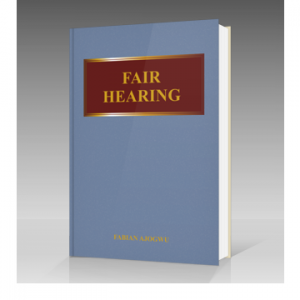The concept of fair hearing is an integral part of the administration of Justice, and derives from the principles of natural justices and fairness. The principles belie the whole jurisprudence of law abased justice. The rule of fair hearing requires that in all disputes between two or more parties, judgment should not be based on a one-sided testimony. It was the Right Hon Lord Temple man, MBE, Lord of Appeal in Ordinary, who once said-‘… the lawyer is a manipulator of words: this is an assertion and not a criticism. Language is the means of disclosing facts, expressing ideas and applying principles.’ The ultimate solution in any legal problem is to be found in the application of basic principles to ascertained facts. This application however must be done in such a way and manner that all parties to the dispute are given and equal opportunity to so present their facts, in order that they may be ascertained by a neutral and fair minded person.
In writing Fair Hearing, it was not my intention to provide a comprehensive survey of all instances of fair hearing in both the judicial and administrative processes. Rather my aim was to provide a practical evaluation of the substantive as well procedural approach to the concept and principles of fair hearing, which is crucial to the administration of justice in any legal system. There appeared to be a need for a textbook, as well as give insights book, as opposed to a source-book, so as to deal with the substantive law a as give insights into the attitudes of Nigeria courts on the subjects, deriving mainly from the 1999 Constitution of the Federal Republic of Nigeria.
I have started with a discussion on the meaning of fair hearing by looking at the twin principles of natural justice, with emphasis on definitions from case law on the basis of the 1999 constitution as well as similar provisions in the 1979 Constitution, as well as the ratified African Charter on Human and Peoples’ Right. In the second chapter, I have attempted to look at the development of the audi altem rule (let the other side be heard), with emphasis on the scope and limitation. More specifically, I have examined the instances where the rule is excluded, and the specific circumstances that must occur to warrant such. Ex parte situations are discussed. I have also looked at the nemo judex in causa sua rule (not to be a judge in one’s own cause), and the attitude of the courts where this issue is raised.
The subject of remedies is so often ignore, yet it is an internal part of the legal process. In the concluding chapter, I have attempted to provide a practical guide to the remedies available under the Fundamental Rights (Enforcement Procedures) Rules of 2009.
All of these have brought dept and meaning to this book on Fair Hearing. This book lays no claim to perfection, and I therefore take full responsibility for any errors of omission or commission that may be found herein.
Fabian Ikenna Ajogwu, SAN, FCIArb
Lagos
October 10, 2010


